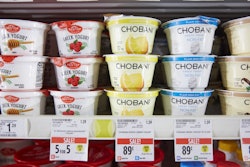
Transparency is becoming increasingly more important to the food and beverage industry as consumers want to know where their food is coming from. However, suppliers, manufacturers and finished goods are reportedly misusing the phrase to gain consumers' trust.
While companies are understanding that transparency is essential to their supply chains, Natural Products Insider reports that they are falling short of disclosing the details of their processes. Food and beverage companies need to set standards when it comes to supply chain transparency so the industry doesn't attract negative consumer and media attention.
Traceability is directly correlated with transparency, and now more than ever consumers are basing their purchases on not only the product's effectiveness and quality, but also the company's sustainability and transparency efforts. According to Natural Products Insider, 94 percent of consumers are likely to be loyal to a brand that offers complete transparency, while 39 percent say they are willing to switch to a brand that is more transparent.
Meanwhile, consumers are also purchasing more sustainable products than ever. A Label Insight report for that 73 percent of millennial responders were willing to pay more for a transparent product. Additionally, consumers believe that sourcing sustainable ingredients is key to transparency and traceable brands.
Natural Products Insider reports that brands are also facing scrutiny to become more transparent from the FDA, FDC, the National Advertising Division, attorneys general, shareholders and more. By becoming transparent, brands can foster long-term brand loyalty and help boost their supply chains. However, becoming transparent takes time and is expensive. Manufacturers need to hold their suppliers accountable
In order to make transparency clear to consumers, brands must have a story, mission and clean label practices. One establishing that, Natural Products Insider suggests that brands market their transparency on all platforms to gain consumer trust. The Center for Food Integrity identified seven elements of clean label culture to help communicate transparency:
- Motivation—act in a manner that is ethical and consistent with stakeholder interests.
- Disclosure—share all information publicly, both positive and negative.
- Stakeholder participation—engage those interested in the brand’s activities or impact.
- Relevance—share information stakeholders deem relevant.
- Clarity—share information that is easily understood and easily obtained. Seventy-four percent of consumers research online when the information on product packaging and labels is not enough to meet their dietary needs, according to the Center for Food Integrity.
- Credibility—share positive and negative information that supports informed stakeholder decision-making and have a history of operating with integrity.
- Accuracy—share information that is truthful, objective, reliable and complete.


















